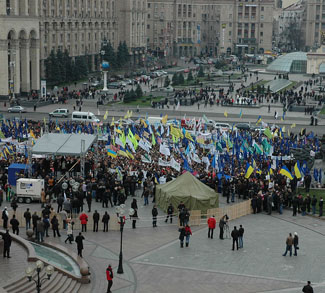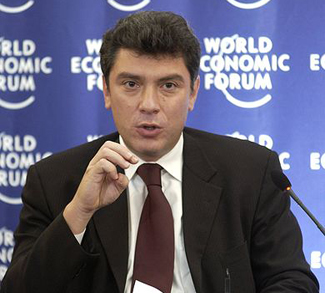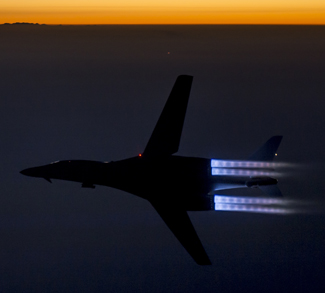To traverse eastern Poland is to feel remarkably close to a history that is deeply interwoven with the present while also bearing witness to Europe’s mortality. At the Majdanek Concentration Camp outside of Lublin and in the small city of Zamość, the ghosts of antisemitism and the racist dogma of Nazism weigh heavily on the future of the Jewish state given the horrors in Europe that were the impetus for that state’s creation. In Rzeszów, the future of Ukraine is being decided as important military hardware from Ukraine’s allies transits through its strategic airport located roughly 90 km from the Ukrainian border. Civilisational battles are being waged in this corner of Europe, under the protection of NATO’s collective defense and the remarkable progression of European unity and integration that has made conflict within the borders of the EU and NATO all but unthinkable.
This part of the world, for better or for worse, remains a vanguard and a bulwark of history. It is the dividing line between dignity and barbarism, a Europe whole and free or one that remains captive to the revanchist aims of its much larger neighbor. It is not a borderland at the edge of Europe but increasingly the capital of, and in Ukraine, the future of, a Europe that exists in its truest and most complicated form. It is not a Europe trying to escape from history but one that brings forth constant reminders of a darker past. In a recent speech at the Sorbonne in Paris, President Emmanuel Macron was right to echo this sentiment by saying ‘our Europe is mortal.’ After two years of conflict in Ukraine, Macron is starting to speak more for Europe, notably because he has listened to and has gained the trust of NATO’s Central and Eastern European member states. An ardent Europhile seeking to break free from history would never dare to preach about Europe’s mortality. However, with the help of Poland, Czechia, and others, the cautious winds of history have started to blow further west, bringing a strategic clarity and foresight to leaders like Macron that is to the benefit of all of Europe.
Traveling through eastern Poland recalls the importance of staying principled and strong in the face of aggression, of not succumbing to half-measures but of going all in for the sake of history. Ukraine feels very close from Lublin, Zamość and Rzeszów, and the psychological impact of NATO as a security guarantor provides a palpable sense of calm and reassurance. Security can be measured in many ways, from the amount of military hardware a state possesses, to where that hardware is positioned, and the percent of GDP a state spends on defense, all of which make Poland one of NATO’s most secure member states. However, security’s most powerful measurement is psychological, knowing that you are safer because of pledges and commitments made amongst allies who will come to your aid in the event of an attack. Poles living in close proximity to the Ukrainian border know this, as does President Putin, signifying a degree of fraternal order and protection that remains non-existent at Ukraine’s opposite border in the east.
Supposed promises made to Gorbachev about the enlargement of NATO in 1990 become irrelevant over 30 years later when the soil is that much more secure and the process of obtaining that security is a result of the wishes of a sovereign people. The smallest Polish villages in the Lublin and Subcarpathian provinces may not be known in all the capitals of NATO, but they have been deemed worth defending. In a region where borders and thus nationality and identity used to constantly change at the barrel of a gun in the 19th and early 20th centuries, there is a comfort in knowing that while no border is inviolable, its legitimacy and defense has become institutionalized. This is the result of many years of painstaking European integration that will one day hopefully extend all the way to Ukraine’s eastern border with its invader and occupier.
As the world increasingly turns its attention to the Indo-Pacific, Africa, and other centers of growth in the 21st century, it can be tempting to view Europe as a relic of the past. However, eastern Poland shatters that narrative, as it is where the questions surrounding Europe’s mortality and the West’s future as a geostrategic actor in a world of enhanced competition and multipolarity are on full display. So long as there is war in Europe, there is increased mortality in Europe as the demons of the past threaten to raise their heads. Europe’s mortality is a direct consequence of its fractious history, just as traveling in eastern Poland serves as a reminder of the thin line between progress and barbarism, of being oppressed versus being the oppressor, and of the dangers of appeasement and complacency in the face of strife. The fields of Lublin and Subcarpathia reveal that nothing in our present moment is black and white, oppression does not discriminate, and there is no fixed power dynamic to provide a sense of moral clarity in times of turbulence.
This Europe is raw and close to the ground, comprised of flawed individuals, imperfect choices, and an internal battle to do what is right versus what is politically expedient. It is fragile yet sacrosanct, rooted in a rich culture, and yet ever susceptible to the act of wandering as great writers such as Joseph Roth and Stefan Zweig have famously chronicled. At a moment’s notice, culture can be erased and survival, that delicate dance with mortality at both the individual and the nation-state level, can guide all actions. To traverse eastern Poland is to bear witness to a tragic history but also a hopeful future should the states of Europe and her allies choose to make it so. Likewise, to declare Europe mortal is to summon its life and the lives of those cut short on its soil in order to help guide the next generation to more prosperous lands.
The views expressed in this article belong to the author(s) alone and do not necessarily reflect those of Geopoliticalmonitor.com.




